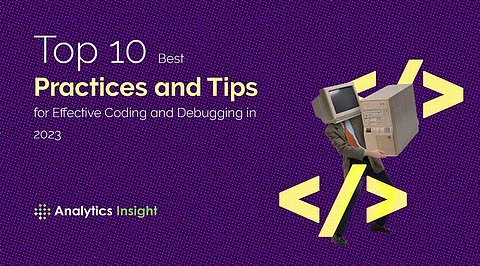
- Insights
- Cryptocurrencies
- Stocks
- White Papers
- Industry
- Geography
- Insights
- Cryptocurrencies
- Stocks
- White Papers
- Industry
- Geography


The evolution of the numerous trends in the software industry has made coding and debugging one of the most significant skills for an individual developer to possess. Coding is a way to connect with a computer, often known as computer programming. Coding is similar to providing a set of instructions to the computer on what to do. You can instruct computers what to do or how to behave much more quickly by writing code. The code is written once. After that, it's read, debugged, refactored, and scaled constantly. The way you write code today will help you scale and maintain the program in the future. In software development, deadline pressure is a common occurrence. Regardless, it's critical to follow best practices and tips for effective coding and debugging to help ensure higher-quality code for both you and anyone who might need to enhance it in the future. Some excellent tips for effective coding and debugging enable you to create websites and apps, and handle data, among many other amazing tasks. Acquiring the essential skills and tips for effective coding and debugging is fabulous for cracking most interviews and developing a bunch of cool projects that you can add to your resume or portfolio. Here we will discuss the top 10 best practices and tips for effective coding and debugging in 2023
Writing simple and easy-to-understand code has always been a superb skill for a programmer. Coding is not a way to showcase your programming skills by writing complex programs that no one can comprehend. The final goal of a code is to resolve a problem. A good programmer is one who comes up with code that is readable, understandable, and testable.
Comments are actually the most critical part of coding. You won't fully understand them until you go away from your 2,000-line script for a few days, then come back to it and try to make sense of it. Making useful comments makes it simpler for you to maintain your code and for others who come after you.
Global variables and loops are actually a mess and can prove problematic when your application upgrades to millions of lines of code (which most do!). They may influence code elsewhere that is difficult to discern, or cause noisy naming clashes. we must think twice before polluting the global namespace with variables, functions, loops, etc.
Never give your variables names like $k, $m, or $test. How do you think such code will be read in the future? In terms of variable names, function/method names, and class names, good code should be meaningful. Meaningful names include $request, $dbResult, and $tempFile as a few examples (depending on your coding style guidelines these may use underscores, camelCase, or PascalCase).
Structuring your application is the most crucial part. Instead of using complicated structures, we should always stick to simplicity. When naming directories and files, use a naming convention you agree upon with your team, or use one associated with your coding standard. Always keep the four components of a typical PHP application separate from one another: the CSS, HTML templates/layouts, JavaScript, and PHP code. Additionally, strive to keep libraries and business logic separate for each component. Maintaining a directory hierarchy that is as shallow as feasible will make it simpler to navigate and locate the code you need.
Write a unit test to confirm the failure and begin debugging when we are aware that the code does not function as expected in a certain circumstance. We identify a good place to start by breaking down a problem into a failing test case. Unit tests also serve as a safeguard against future regressions for the same test case.
This is a straightforward and frequently used debugging strategy, and we can see that some of the most senior Engineers utilize it as well. To help you verify the accuracy of code execution, include a tonne of log statements that contain data about the status of the program. In addition, it may be possible to debug edge cases by significantly altering the code to include early returns, conditional returns, etc.
Determining commits that went in since the last time the code worked fine will help you cut down the problem space. By combing through the git diff you can easily determine changes that could have potentially caused the bug. Git tools such as git bisect, git blame and git log are very much helpful to check for regressions, and potentially pull requests that might be the cause of the bug.
This is among the best practices and tips for effective coding and debugging that all of us should follow – copy and paste the error log and look for answers. And you must be having the idea that there are efficient ways to go about flexing your Google-foo.
It is helpful to have a record of activities or actions that you have already tried as you go down the debugging hole. This might aid in establishing context when you describe the issue to someone else, in addition to giving you a little mental clarity for yourself. Additionally, once the issue has been resolved, you can record it in the ticket for future use by the team and yourself.
